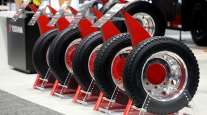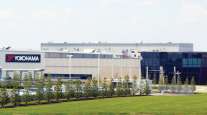Features Editor
Yokohama Executives Say Fleets Still Adjusting Post-Pandemic

[Stay on top of transportation news: Get TTNews in your inbox.]
WEST POINT, Miss. — Executives from Yokohama Tire Corp. said their motor carrier customers have adjusted well to the post-COVID economy, but maintain that circumstances for these commercial fleets have not returned to business as usual.
“I don’t think recovered is the correct term,” said Dan Funkhouser, the company’s vice president of commercial tire sales, during an Oct. 12 event held to mark the 10th anniversary of Yokohama’s manufacturing plant. “I think adapting to the changes caused by the pandemic is a better way to look at it. Trucking, like every other industry, had to make changes in order to limit the impact of the pandemic. Some of those, such as the use of technology to communicate, will remain and help in the future. Others, like the driver shortage, which existed before the pandemic, continue to cause issues.”
He added, “There are not enough drivers to carry all the freight that is available. This affects everything from repairs and overhauls to just general and scheduled maintenance.”
Supply chain and economic inconsistencies also prevalent during the pandemic likewise haven’t completely gone away, he noted.

Funkhouser
“We went from not having enough equipment and extremely high rates to a surplus capacity and rates decreasing,” Funkhouser said. “Other issues are also at play: Inflation will continue to lower the purchasing power of the public. Lower purchases will lower manufacturing and thus lower demand for trucks.”
Whereas during the pandemic fleets were simply scrambling to find what they needed to keep trucks on the road, in the current environment they’re being more selective, said Stan Chandgie, Yokohama’s executive vice president of sales and support. He told Transport Topics that fleet managers are searching for the best value and overall better total cost of ownership.
“In the last couple of years, that might have been more of a challenge because it might have been what [fleets] could get at that time when you needed to get that truck up and running,” Chandgie explained. “I think everybody at every level continues to look at how they can be smarter about how they’re operating.”
Yokohama President and CEO Jeff Barna told TT that he maintains an optimistic view for the U.S. commercial market. He pointed to the company’s acquisition earlier this year of Trelleborg Wheel Systems and broader plans to add sales staff as factors that he hopes will propel it forward with commercial customers. “We want to add to our sales force density, and be proactive at the fleet level,” he said.
In particular, he said Yokohama believes the acquisition of Trelleborg — which makes specialty tires and accessories — will help it reach a more optimal sales composition. Barna stressed that the company also plans to keep a focused eye on its core North American commercial fleet market.
“Even pre-dating COVID, we have indexed very well,” he said, adding that Yokohama wants to “meet with more dealers as we have more feet on the ground.”

Yokohama President and CEO Jeff Barna said the company’s acquisition of Trelleborg Wheel Systems will help it reach a more optimal sales composition. (Yokohama Tire Corp.)
Talk of the future sat against the backdrop of the ceremonial event for the West Point plant, which broke ground in September 2013 and launched production in October 2015. It produces Yokohama’s commercial tires for primarily medium-duty and commercial trade vehicles.
“The plant you are seeing today utilizes some of the most state-of-the-art tire building equipment, automated tire building technology known to our industry,” Barna said. The 1 million-square-foot facility spans 570 acres and holds over 900 employees that produce more than 800,000 tires annually.
West Point Mayor Rod Bobo during the ceremony recalled a time when West Point was mired in double-digit unemployment and struggled to balance its budget. Employment at the factory has brought the city’s unemployment numbers to historically low levels.
“This is largely attributed to the economic footprint in the community that Yokohama has made,” he said, adding the jobs and production from the plant have over the years resulted in a positive ripple effect on the local economy.
Want more news? Listen to today's daily briefing below or go here for more info:




